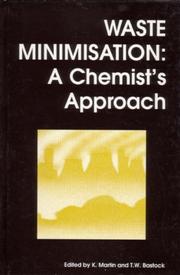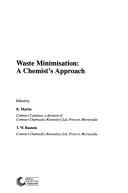| Listing 1 - 10 of 37 | << page >> |
Sort by
|
Book
ISBN: 0128221836 012822438X 9780128224380 9780128221839 9780128224380 Year: 2021 Publisher: Amsterdam, Netherlands ; Kidlington, Oxford, England ; Cambridge, Massachusetts : Elsevier,
Abstract | Keywords | Export | Availability | Bookmark
 Loading...
Loading...Choose an application
- Reference Manager
- EndNote
- RefWorks (Direct export to RefWorks)
Waste minimization. --- Minimization of waste --- Reduction of waste --- Waste reduction --- Conservation of natural resources --- Pollution prevention --- Refuse and refuse disposal
Book
ISBN: 9811676836 9811676828 Year: 2022 Publisher: Singapore : Springer,
Abstract | Keywords | Export | Availability | Bookmark
 Loading...
Loading...Choose an application
- Reference Manager
- EndNote
- RefWorks (Direct export to RefWorks)
Waste minimization. --- Minimization of waste --- Reduction of waste --- Waste reduction --- Conservation of natural resources --- Pollution prevention --- Refuse and refuse disposal
Dissertation
Year: 2024 Publisher: Liège Université de Liège (ULiège)
Abstract | Keywords | Export | Availability | Bookmark
 Loading...
Loading...Choose an application
- Reference Manager
- EndNote
- RefWorks (Direct export to RefWorks)
This research thesis explores the optimization of resources for sustainable growth within Morocco’s tomato industry through the application of circular economy principles. The study focuses on how resource optimization can enhance sustainability and efficiency, addressing critical challenges such as water scarcity, soil degradation, and climate change impacts. By integrating circular economy practices, the agricultural sector can transition from a linear ‘take, make, dispose’ model to a more sustainable ‘reuse, recycle, regenerate’ approach. The research involves a comprehensive literature review and empirical data collection through semi-structured interviews with stakeholders across the tomato industry value chain. Key areas of resource optimization identified include renewable energy integration, waste reduction and recycling, and innovative water management techniques. The findings aim to provide actionable strategies for transforming the tomato industry, aligning with national sustainability initiatives like the Green Morocco Plan, and ultimately contributing to a more resilient and sustainable agricultural sector in Morocco.

ISBN: 1845692918 1855738163 9781855738164 Year: 2009 Publisher: Oxford, [England] ; Cambridge, [England] ; New Delhi, India : Woodhead Publishing Limited,
Abstract | Keywords | Export | Availability | Bookmark
 Loading...
Loading...Choose an application
- Reference Manager
- EndNote
- RefWorks (Direct export to RefWorks)
Chemical industry --- Waste minimization --- Government policy --- Minimization of waste --- Reduction of waste --- Waste reduction --- Conservation of natural resources --- Pollution prevention --- Refuse and refuse disposal --- Chemical industries --- Chemicals --- Man-made chemicals industry --- Synthetic chemicals industry --- Industries --- Manufacture and industry
Book
ISBN: 9783038263630 303826363X 9783037859827 Year: 2014 Publisher: Zurich, Switzerland
Abstract | Keywords | Export | Availability | Bookmark
 Loading...
Loading...Choose an application
- Reference Manager
- EndNote
- RefWorks (Direct export to RefWorks)
With the development of industry and the improvement of living standards, the amount of solid waste is increasing rapidly. New research and industries solutions in the field of waste management and recycling become increasingly important. The volume highlights the academic and policy trends on waste management and collects the latest research trends and innovative ideas in the solid waste field. The peer reviewed papers are grouped as follows: Chapter 1. Circular Economy and Urban Mining; Chapter 2. Industrial Waste; Chapter 3. Electrical and Electronic Waste; Chapter 4. Biomass Energy; Chapte
Refuse and refuse disposal --- Recycling (Waste, etc.) --- Waste minimization --- Waste disposal sites --- Waste disposal in the ground --- Minimization of waste --- Reduction of waste --- Waste reduction --- Conservation of natural resources --- Pollution prevention --- Environmental aspects
Book
ISBN: 012824321X 0128243201 9780128243213 9780128243206 Year: 2022 Publisher: Amsterdam, Netherlands : Elsevier,
Abstract | Keywords | Export | Availability | Bookmark
 Loading...
Loading...Choose an application
- Reference Manager
- EndNote
- RefWorks (Direct export to RefWorks)
Book
ISBN: 0323854036 0323854044 9780323854047 9780323854030 Year: 2021 Publisher: San Diego : Elsevier,
Abstract | Keywords | Export | Availability | Bookmark
 Loading...
Loading...Choose an application
- Reference Manager
- EndNote
- RefWorks (Direct export to RefWorks)
Emerging Trends to Approaching Zero Waste: Environmental and Social Perspectives thoroughly examines the impact of various technological innovations, current guidelines and social awareness on the reduction of waste, with the ultimate aim of achieving the zero-waste target. Insights in the book will help users adopt the best possible methodologies at grass-root levels and show how modern societal procedures are becoming sustainable, with a goal of zero waste. It comprehensively discusses the scientific contributions of the environmental and social sector, along with the tools and technologies available for achieving the zero-waste targets. This book is the first step toward understanding state-of-the-art practices in making the zero-waste goal a reality. It will be especially beneficial to researchers, academics, upper-level students, waste managers, engineers and managers of industries researching or hoping to implement zero-waste techniques.
Waste minimization. --- Minimization of waste --- Reduction of waste --- Waste reduction --- Conservation of natural resources --- Pollution prevention --- Refuse and refuse disposal --- Waste minimization --- Source reduction (Waste management) --- Technological innovations. --- Social aspects.

ISBN: 0851865852 Year: 1994 Publisher: Cambridge : Royal Society of Chemistry,
Abstract | Keywords | Export | Availability | Bookmark
 Loading...
Loading...Choose an application
- Reference Manager
- EndNote
- RefWorks (Direct export to RefWorks)
afval --- chemie --- Environmental protection. Environmental technology --- Chemical industry --- -Waste minimization --- -Minimization of waste --- Reduction of waste --- Waste reduction --- Conservation of natural resources --- Pollution prevention --- Refuse and refuse disposal --- Chemical industries --- Chemicals --- Man-made chemicals industry --- Synthetic chemicals industry --- Industries --- Waste minimization --- -Government policy --- -Manufacture and industry --- -Chemical industry --- Minimization of waste --- Government policy --- Manufacture and industry
Book
ISBN: 9280713035 9789280713039 Year: 1991 Volume: 7 Publisher: Paris Vienna UNEP UNIDO
Abstract | Keywords | Export | Availability | Bookmark
 Loading...
Loading...Choose an application
- Reference Manager
- EndNote
- RefWorks (Direct export to RefWorks)
Waste minimization --- Factory and trade waste --- -Measurement --- -Waste minimization --- Minimization of waste --- Reduction of waste --- Waste reduction --- Conservation of natural resources --- Pollution prevention --- Refuse and refuse disposal --- Factory waste --- Industrial effluents --- Industrial wastes --- Solid waste management --- Trades-waste --- Wastewaters --- Plant engineering --- Centralized industrial waste treatment facilities --- Pollution --- Waste products --- Measurement --- Waste minimization. --- Measurement. --- Factory and trade waste - - Measurement --- -Factory and trade waste
Book
ISBN: 0873393694 9780873393690 Year: 1996 Publisher: Warrendale Minerals, Metals & Materials Society
Abstract | Keywords | Export | Availability | Bookmark
 Loading...
Loading...Choose an application
- Reference Manager
- EndNote
- RefWorks (Direct export to RefWorks)
Metallurgical plants --- Metallurgy --- Waste disposal --- Congresses --- Environmental aspects --- -Waste minimization --- -Minimization of waste --- Reduction of waste --- Waste reduction --- Conservation of natural resources --- Pollution prevention --- Refuse and refuse disposal --- Factories --- -Congresses --- Waste minimization --- -Waste disposal --- Minimization of waste --- Waste disposal&delete& --- Déchets --- Déchets --- Métallurgie extractive --- Recyclage (déchets, etc.) --- Metallurgical plants - Waste disposal - Congresses --- Waste minimization - Congresses
| Listing 1 - 10 of 37 | << page >> |
Sort by
|

 Search
Search Feedback
Feedback About UniCat
About UniCat  Help
Help News
News